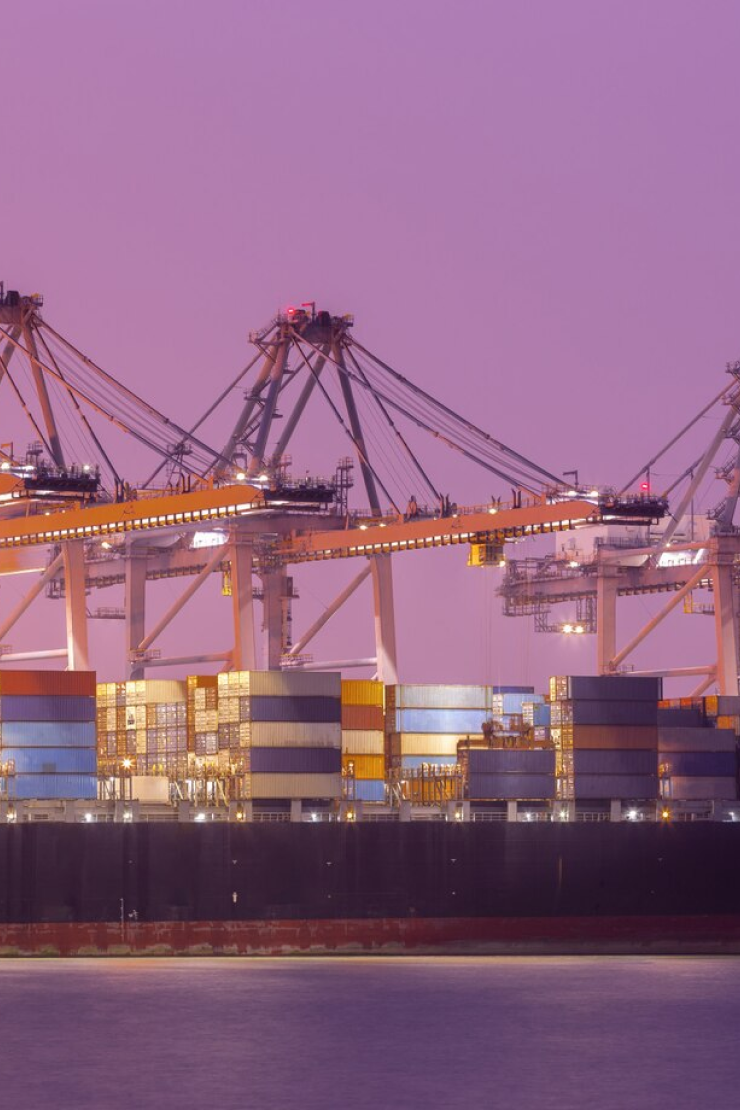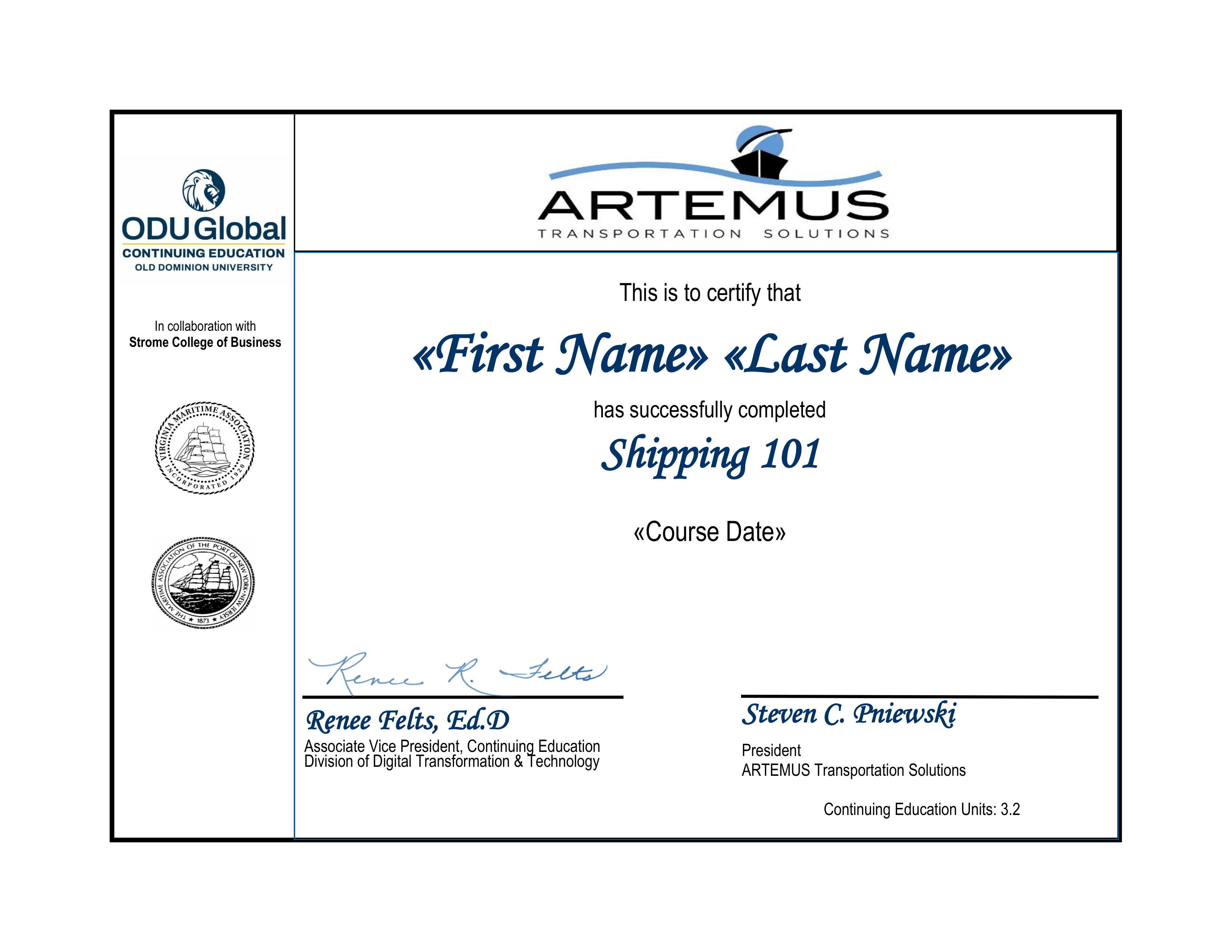Course Overview
This course provides an in-depth exploration of terminal and marine operations, focusing on key functions, equipment management, and safety protocols essential for efficient terminal operations.
- The Gate Complex
- Container Yard Operations
- Container Freight Station
- Marine Operations
- Safety & Equipment
- Review Of Information / Key Terms
What You Will Learn?
This course offers an in-depth exploration of terminal and marine operations, providing you with the practical knowledge and skills needed to excel in managing terminal functions, equipment, and safety procedures effectively.
The Gate Complex
Dive into the essential functions at the gate complex, including the roles and processes that ensure seamless coordination between incoming and outgoing cargo, contributing to smooth terminal operations.
Container Yard Operations
Learn how to efficiently manage container yard operations, focusing on equipment handling, storage strategies, and maintaining optimal flow to prevent bottlenecks and ensure timely cargo movement.
Container Freight Station
Get an in-depth understanding of break-bulk cargo handling, including best practices for container stuffing and stripping, vital for effective cargo management at container freight stations.
Marine Operations
Explore key aspects of marine operations, including the stowage process, vessel loading and unloading procedures, and how to optimize cargo movement for safe and efficient marine terminal performance.
Safety & Equipment
Gain insights into critical safety protocols on the marine terminal, along with the proper use and maintenance of equipment to ensure operational safety and compliance with regulations.
Review Of Information / Key Terms
Solidify your knowledge by reviewing essential terms and concepts covered in the course, with a final quiz to test your understanding and readiness for terminal and marine operations.
By Artemus Transportation Solutions
With a dedicated legacy since 2004, Artemus Transportation Solutions has become a trusted leader in transportation compliance solutions, offering cutting-edge ISF, AMS, Customs Broker, & eManifest Canada & Japan AFR software. Our years of hands-on industry experience allow us to deliver impactful training courses that go beyond theory, empowering professionals with real-world knowledge.
- 19+ Years of Expertise in Global Transportation Compliance Solutions.
- Practical, real-world insights into Customs, Import, and Export processes.
- Hands-on training in managing complex transportation equipment logistics.
- Efficient solutions for navigating International Shipping and related challenges.

Recognized Certification From Artemus Transportation Solutions
Upon completing the International Shipping course, you'll receive a Certificate of Completion from Artemus Transportation Solutions. This certification highlights your expertise in global shipping processes & compliance, making it a valuable addition to your skills.

Our Reviews
Frequently Asked Questions
Who Is The Course Designed For?
This course is tailored for professionals at all levels, from beginner to intermediate learners, who are looking to enhance their knowledge of global shipping, logistics, & compliance.
What Topics Are Covered In The Terminal & Marine Operations Course?
The course covers key aspects of terminal and marine operations, including gate complex operations, container yard management, container freight stations, marine operations, safety and equipment management, and a review of key terms and information.
What Is The Role Of A Container Freight Station (CFS)?
A Container Freight Station (CFS) is where cargo is consolidated or deconsolidated before or after shipment. The course covers its function in handling cargo that is too large or complex to be directly handled by a container, focusing on its importance in the logistics chain.
Will I Receive A Certification Upon Course Completion?
Yes, you’ll receive a Certificate of Completion from Artemus Transportation Solutions, which can be showcased on your professional profiles.
Are The Courses Self-Paced Or Instructor-Led?
This course offers a flexible, self-paced learning format with video pre-recorded lessons, allowing you to complete them at your convenience. This approach enables you to learn at your own pace & revisit material as needed.
Do I Need Prior Experience In Shipping Or Logistics To Take This Course?
While prior experience is helpful, our beginner & intermediate-level courses provide foundational knowledge, making them accessible even for those new to the industry.
How Can This Course Benefit My Career?
By completing this course, you’ll gain practical, real-world insights that can boost your skills, enhance your compliance knowledge, & advance your career in the shipping & logistics industry.
What Makes Artemus’s Terminal & Marine Operations Course Different From Others?
Artemus’s course provides an in-depth, hands-on approach to terminal and marine operations, focusing on real-world scenarios, equipment management, and safety protocols. It equips learners with actionable insights to improve efficiency and ensure safe, compliant terminal operations.
Terminal & Marine Operations Course: Understand port operations and marine terms
Container yard operations: managing cargo flow efficiently
Container yard operations involve the handling, storage, and movement of containers at ports. Efficient management ensures smooth cargo flow, minimizing delays and optimizing space utilization. Advanced technologies like automated stacking and tracking systems enhance efficiency. Proper coordination between shipping lines, customs, and transport providers is crucial. Effective yard planning reduces congestion and turnaround times, improving overall port operations.
Container freight station: role in cargo consolidation and storage
A container freight station (CFS) is a crucial hub for consolidating and deconsolidating shipments. It facilitates the movement of less-than-container-load (LCL) cargo, optimizing costs for shippers. CFS services include storage, customs clearance, and cargo inspection. These stations improve supply chain efficiency by streamlining logistics processes. Businesses use CFS facilities to ensure timely and cost-effective international trade operations.
World trade distribution - container freight station services explained
World Trade Distribution provides container freight station (CFS) services to support global supply chains. Their facilities handle cargo consolidation, storage, and customs documentation. These services ensure the smooth transition of shipments between different transport modes. By offering bonded warehousing, they enhance cargo security and compliance. Their role in international trade helps businesses optimize logistics costs and efficiency.
Container freight station meaning: understanding its function in logistics
A container freight station (CFS) is a facility where goods are temporarily stored before export or after import. It is essential for consolidating smaller shipments into full container loads. CFS locations assist with customs clearance, reducing delays in the supply chain. These stations play a key role in international trade compliance. Their function enhances cargo handling efficiency and cost management.
What is a container freight station? a comprehensive overview
A container freight station (CFS) is a logistics hub for handling, storing, and processing cargo. It facilitates efficient transportation by consolidating smaller shipments. CFS stations streamline customs clearance and cargo inspections. These facilities are vital for reducing shipping costs and improving logistics efficiency. They also offer secure storage solutions for exporters and importers.
Marine operations center: coordinating maritime activities seamlessly
A marine operations center is responsible for monitoring and managing maritime activities. It ensures safe navigation, cargo tracking, and emergency response coordination. These centers use advanced communication systems to oversee port and vessel operations. They play a critical role in optimizing shipping schedules and reducing port congestion. Efficient marine operations contribute to global trade efficiency.
Marines special operations: elite forces and their missions
Marines special operations units specialize in high-risk missions, including counterterrorism and reconnaissance. These forces undergo intense training to operate in extreme conditions. Their expertise includes direct action, intelligence gathering, and unconventional warfare. Marines special operators play a crucial role in global security. Their rapid deployment capability makes them an essential part of defense strategies.
Marine corps operator: training and responsibilities in combat operations
A marine corps operator is a highly trained soldier specializing in combat and strategic missions. Their training includes weapons handling, survival tactics, and mission planning. Operators are deployed in diverse environments, from urban warfare to maritime security. They ensure operational success through precision and adaptability. Their role is crucial for maintaining national and global security.
Marine corps operational risk management: ensuring safety and efficiency
Operational risk management (ORM) in the marine corps identifies and mitigates potential hazards. It applies to combat training, equipment use, and mission planning. Marines follow ORM principles to reduce accidents and enhance mission effectiveness. Safety protocols help ensure personnel protection and operational readiness. Proper risk assessment leads to more successful military operations.
Marine corps special operations command: an overview of MARSOC
The marine corps special operations command (MARSOC) is an elite force responsible for specialized missions. It conducts counterterrorism, direct action, and reconnaissance operations worldwide. MARSOC operators are trained in unconventional warfare tactics. They work with allied forces to enhance global security. Their strategic capabilities contribute to national defense initiatives.
Marine forces special operations command: role in global security
Marine forces special operations command (MARSOC) executes high-stakes military missions globally. These forces specialize in intelligence gathering, crisis response, and combat operations. They operate in challenging environments, ensuring security and stability. MARSOC personnel undergo rigorous training to adapt to evolving threats. Their role strengthens international military alliances and defense strategies.
Marine heavy equipment operator: skills and responsibilities
Marine heavy equipment operators handle large machinery for military and logistical operations. They operate bulldozers, excavators, and cranes to support infrastructure projects. Their work includes constructing roads, airstrips, and military bases. Operators receive specialized training to perform in demanding environments. Their role is vital for mission success in combat and disaster response efforts.
Marine operations: key functions in port and vessel management
Marine operations oversee the safe and efficient movement of ships and cargo. They include vessel traffic control, port maintenance, and safety inspections. Effective marine operations minimize delays and ensure smooth supply chain flow. Port authorities and logistics providers collaborate to optimize shipping efficiency. Advanced tracking systems improve real-time coordination and risk management.
Marine radio operator licence: requirements and application process
A marine radio operator license is required for professionals handling maritime communications. It ensures operators are trained in emergency procedures and radio transmission protocols. The licensing process includes passing an examination on radio operation and safety. Certified operators play a crucial role in ensuring effective ship-to-shore communication. This license is essential for maintaining maritime safety and security.
Marine radio operators license: importance for maritime communication
A marine radio operator’s license authorizes individuals to use maritime communication systems. It is vital for ship captains, navigators, and emergency responders. The license ensures proficiency in handling distress signals and navigation communications. Proper training enhances safety and coordination at sea. Regulatory authorities issue licenses to ensure compliance with international communication standards.
Heavy equipment operator marines: essential skills and duties
Heavy equipment operators in the marines are responsible for handling construction machinery. They build infrastructure to support military operations and disaster relief efforts. Operators are trained in advanced machinery handling techniques. Their work includes clearing runways, constructing fortifications, and setting up logistics hubs. Their expertise contributes to mission success in various terrains.
Marina operators: managing docking, storage, and safety
Marina operators oversee docking facilities, ensuring secure and efficient boat storage. They manage vessel berthing, maintenance, and fueling services. Safety regulations and environmental guidelines are strictly enforced at marinas. Operators also coordinate emergency response plans for maritime incidents. Their role is critical in maintaining smooth marina operations.
Marine safety: best practices for safe maritime operations
Marine safety involves regulations, training, and equipment to prevent accidents at sea. Best practices include proper vessel maintenance, emergency preparedness, and crew training. Regulatory agencies enforce safety standards to protect lives and cargo. Navigational safety protocols help avoid collisions and environmental hazards. Implementing safety measures enhances operational efficiency and risk management.
Maritime safety: regulations and guidelines for seafarers
Maritime safety focuses on international regulations that protect ships, crew, and cargo. These guidelines include safety inspections, emergency response procedures, and environmental protection laws. Compliance ensures accident prevention and efficient vessel operations. Seafarers undergo rigorous training to handle onboard emergencies. Strict enforcement of safety measures enhances global maritime security.
Maritime safety authority: enforcing compliance and security
A maritime safety authority regulates and enforces safety standards for ships and ports. It ensures compliance with international maritime laws. Authorities conduct inspections and implement risk management strategies. Their role includes overseeing vessel licensing, training programs, and pollution control measures. Effective governance enhances global maritime trade and environmental sustainability.
Safety at sea: precautions to prevent maritime accidents
Safety at sea is essential for protecting crew members, passengers, and cargo. Precautions include proper vessel maintenance, life-saving equipment, and adherence to navigation rules. Training programs ensure seafarers are prepared for emergencies. Weather monitoring and real-time tracking reduce accident risks. Strict enforcement of safety regulations helps prevent maritime disasters.
Marine safety and security: ensuring protection in waterborne activities
Marine safety and security focus on safeguarding vessels, crew, and cargo from hazards. Security measures include piracy prevention, onboard surveillance, and emergency response protocols. Safety regulations ensure compliance with international maritime standards. Crew members receive specialized training to handle security threats effectively. Implementing strict safety measures enhances operational efficiency and risk management.
Maritime safety and security: global standards and implementation
Maritime safety and security involve international regulations to protect ships and ports. These standards address accident prevention, cargo protection, and environmental conservation. Governments and maritime organizations enforce compliance through inspections and training programs. Advanced surveillance systems help detect and prevent security breaches. Proper implementation enhances global trade safety and efficiency.
IMO regulations: international standards for shipping safety
The International Maritime Organization (IMO) sets global shipping safety standards. IMO regulations cover vessel construction, navigation safety, and pollution control. Compliance ensures safe and efficient maritime transport. Regular inspections and audits verify adherence to international protocols. These regulations play a vital role in maintaining global maritime security.
Container terminal: infrastructure and operations for cargo handling
A container terminal is a specialized facility for loading and unloading shipping containers. It includes cranes, storage yards, and transportation links for smooth cargo movement. Efficient terminal operations reduce ship turnaround times and improve logistics flow. Advanced tracking and automation systems enhance efficiency. Container terminals play a crucial role in global supply chain management.
Container yard: logistics and storage in port facilities
A container yard is a designated area within a port for temporary container storage. It serves as a crucial link between shipping lines, transport providers, and customs authorities. Efficient yard operations help prevent congestion and delays. Automated stacking systems and real-time tracking optimize space utilization. Well-managed container yards contribute to seamless cargo movement and port efficiency.
20 yard container: uses, dimensions, and capacity
A 20-yard container is widely used for transporting goods internationally. It measures approximately 20 feet in length, making it ideal for smaller shipments. These containers are suitable for businesses needing cost-effective shipping solutions. They are commonly used for household goods, machinery, and retail products. Their compact size makes them easier to transport and handle.
40 yard container: specifications and ideal applications
A 40-yard container is designed for large-scale cargo transportation. It provides double the capacity of a 20-yard container, making it ideal for bulk shipments. These containers are commonly used for industrial equipment, vehicles, and oversized goods. Their standardized dimensions ensure compatibility with global shipping networks. Businesses use them for cost-efficient logistics in international trade.
FAQs
-
What is the role of a container freight station in shipping?
A container freight station (CFS) serves as a consolidation and storage facility where cargo is grouped before being transported. It plays a key role in deconsolidation, customs clearance, and temporary storage for both imports and exports. CFS operations help streamline supply chains by reducing congestion at ports and ensuring smooth cargo movement.
-
How does a container terminal operate?
A container terminal is a high-capacity facility where shipping containers are loaded and unloaded from vessels. It involves various processes, including cargo handling, storage, and intermodal transport connections. Advanced technologies like automated cranes and tracking systems enhance efficiency, reducing turnaround times for ships and trucks.
-
What is the difference between a container yard and a container terminal?
A container terminal is a large-scale facility where cargo is transferred between ships, trucks, and trains, while a container yard is a designated area within the terminal for storing and organizing containers before they are shipped or transported further. The yard plays a crucial role in managing cargo flow and minimizing congestion.
-
Why is maritime safety important?
Maritime safety ensures the protection of vessels, cargo, and crew from hazards like accidents, environmental damage, and piracy. Regulations set by international bodies such as the IMO help enforce safety measures, including emergency preparedness, pollution control, and proper vessel maintenance.
-
What are IMO regulations, and why do they matter?
IMO regulations are international standards established by the International Maritime Organization to enhance shipping safety, prevent pollution, and improve maritime security. These regulations help ensure that vessels operate efficiently and adhere to strict safety and environmental guidelines.
-
What factors influence container yard efficiency?
Container yard efficiency depends on factors such as space utilization, stacking strategies, automation, and real-time tracking systems. Proper planning and technology integration help reduce congestion and improve cargo flow, ensuring seamless port operations.
-
What types of cargo are commonly transported in 20-yard and 40-yard containers?
A 20-yard container is typically used for small to medium-sized shipments, such as furniture, textiles, and retail goods. A 40-yard container, on the other hand, is preferred for large-scale cargo like industrial equipment, automobiles, and oversized goods. The choice depends on the volume and weight of the shipment.
-
How does a marine operations center function?
A marine operations center monitors and coordinates maritime activities, including vessel navigation, security, and emergency response. It uses real-time tracking systems, communication networks, and data analytics to ensure safe and efficient maritime transport.
-
How can ports improve safety at sea?
Ports can enhance safety at sea by implementing strict security protocols, conducting regular inspections, and enforcing international maritime regulations. Training programs for crew members and advanced surveillance systems also contribute to accident prevention and security management.
















